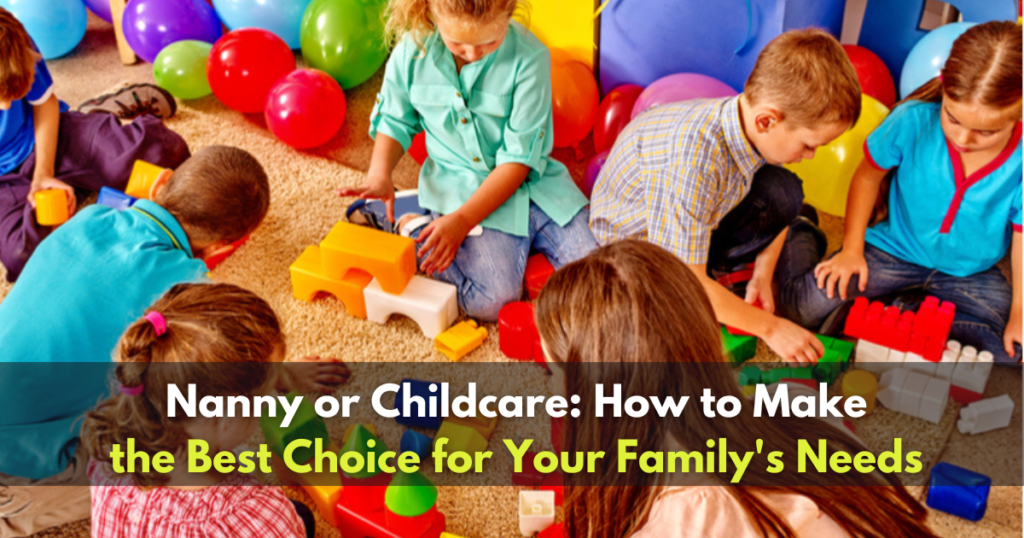Parenting means making tens of thousands of decisions, and perhaps few of them are as urgent as the decision about the best way to take care of the infant. This all is also balancing work, life, and everything in between. Both have their types of benefits. What is right for your family? Whether your child requires one-on-one care or a structured social setting, the nanny vs. daycare decision can be overwhelming. This guide brings key differences and benefits to both attention so you can determine what’s best for your situation with your family. Choosing the right child care doesn’t have to make your head spin. At the end of this blog post You’ll get to know the pros and cons of each option. And therefore get a much clearer picture of what is best suited to the needs of your family, your preferences, and your budget. Come along, and let’s dive into the world of childcare. So that you can rest comfortably. Your baby is in the right hands.
What is a Nanny?
A nanny is a professional carer who provides individualized care for children in the home. This is quite often in the family’s own house. Unlike daycare or group child care, nannies provide personalized attention. This is particularly so depending on your child’s needs and the common babysitting services may vary. However, they normally have such a duty as preparing foods and planning educational activities. Assistance with homework, transportation, or school Some parents prefer to engage a private nanny. Specifically tailor-made for them High degree of flexibility and customization The nanny is much more than a child assistant. She is a trusted authority to whom children would look up. She is in their care While developing each child. and compatible with the lifestyle of the family If you need part-time attention or full-time care. A nanny is part of your household. To have their needs met in a familiar environment.
What is Childcare?
Child care is generally defined as the care and supervision of children. This is provided by professional establishments that are commonly known as child care centers or day care facilities. These centers provide structure group care. Children are cared for in a safe and orderly environment by trained caregivers. Child care services are to help working parents find a place where their children can learn, play, and interact with peers for the better part of the day. A child care environment is much more than an institutional setting for supervision. Provide early social skills and learning through daily activities and play-day-care programs have a specific syllabus that encourages children to Get children ready for school by providing activities that intellectually, emotionally, and physically develop them with the added feature of caring for children of all age groups. Child care centers provide a happy, warm, nurturing environment that aids in the development and growth of children, as parents find professional satisfaction.
Nanny vs. Childcare: Key Differences
| Key Differences | Nanny | Childcare Center |
| Personalized Care vs. Group Care | Nannies provide one-on-one, personalized care tailored to the child’s routine and needs. | Childcare centers provide group care where multiple children are cared for in a structured environment. |
| Cost Comparison | Nannies tend to be more expensive due to individualized care, often charging hourly or on a salary basis. | Childcare centers are generally more affordable, charging fixed monthly or weekly fees, but the cost varies based on the age and location. |
| Schedule Flexibility | Nannies offer more flexibility with schedules, adapting to the family’s needs, including weekends and after-hours. | Childcare centers operate on fixed schedules, often with strict drop-off and pick-up times. |
Why Some Parents Choose a Nanny Over Daycare?
Many parents choose a nanny for day-time care; this is because it gives them a very good type of control over the schedule of their child, which otherwise would be compromised in the case of daycare. With a nanny You can make a personalized schedule suited for your family only. Weekends, evenings or even during the weekdays. It is not like daycare centers that have set pick-up and drop-off times. A full-time nanny can work on your very specific schedule. By providing personal care whenever needed. One of the significant advantages of having a nanny is that your child will not be prone to various diseases. Since your child is comfortably at home. They are thus in a reduced risk of contracting infectious diseases common in daycare environments. Furthermore, the one-on-one attention usually due by nannies often builds deep personal bond between the child and the caregiver. Creating a stable and supportive parenting environment But it also gives peace of mind to parents knowing that their child is being cared for personally and lovingly. for many families These babysitting benefits make choosing a babysitter a preferred option when compared to day care.
When is Daycare a Better Option?
Daycare can be a good choice for families. This is particularly true for children between 9 to 18 months old because it provides advantages that are not easy to be replicated at home. The possible benefits in terms of socialization are perhaps the greatest advantages of daycare. In the day care, a child is exposed to other children. There are many families, especially those with limited budgets, who begin learning social skills such as sharing, cooperation, and communication when these children are still quite young. Compared to full-time babysitting, daycare is more affordable. Generally, group settings are cheaper. Child care centers often provide a structured learning environment filled with educational activities designed to Promote early childhood development From cognitive skills to physical development These structured child care learning activities can help give your child a strong foundation for future school learning. For parents looking for affordability and an environment that stimulates their child’s growth. Day care facilities may be the ideal alternative.
Pros and Cons of Hiring a Nanny
| Advantages | Disadvantages |
| Personalized attention for your child | Higher cost |
| Flexible scheduling | Dependency on one person for care |
| Childcare in the comfort of your home | Privacy concerns |
| Potential assistance with household tasks |
Pros and Cons of Childcare Centers
| Advantages | Disadvantages |
| Interaction with other children | Less schedule flexibility |
| Structured daily activities | Increased exposure to illnesses |
| Generally lower cost compared to a nanny | Less personalized attention |
| Coverage for staff illness or absence |
Common Questions About Nannies and Childcare
Is it better to say nanny or babysitter?
A nanny is a professional caregiver who provides long-term, personal care for children. While babysitters usually provide short-term care from time to time when parents need temporary assistance.
What’s the difference between a nanny and a nursery?
Nanny; she provides individual care in a child’s home. one-to-one attention to children and personal relationships with them. Day care center; it can accommodate multiple children and look after groups of them. It revolves around organized activities and forcing kids to conform to social pre-molds.
What is the ideal nanny age?
An ideal candidate would be someone with 18 to 24 years old, specifically for entry-level positions. More often than not, the family will hire a nanny to take care of the kids from infancy till toddlerhood. That will be the most prime time for personal care.
Does nanny mean a babysitter?
No, Nanny provide full-time ongoing care and are generally more experienced. A baby sitter provides short-term or occasional care for a few hours at a time.
How do I know if my child is ready for daycare?
Parents are always wondering at what age or point of their child’s life he or she is ready for day care. The average age when children start to benefit from the social interaction and structure that day care offers is about 12 to 18 months old.
What should a nanny be qualified in?
When choosing a nanny, it is necessary to consider that she must possess qualifications such as experience with children belonging to the same age group, first aid and CPR certification along with potentially some schooling in early childhood education. The parents seek the nanny who should be capable enough to deal with emergencies and keep children healthy.
What is the child-to-carer ratio in daycare?
Daycare centers operate with a set number of caregivers in comparison to children that also depends on age, but generally, a one-to-three-to-four infants ratio and older children can have a one-to-one ratio. 5-6 people It helps explain why you may need to make parents aware of whether or not their child is getting enough attention by knowing those ratios.
How can I trust my nanny?
Parents will usually keep a watchful eye on every little detail about the person’s character. Ask for information from previous employers Have a probationary period whereby you can observe how the nanny interacts with the kids and keeps an open line of communication. And regular updates from the nanny can make you more trusting towards them.
What are average price of daycare compared to a nanny?
Day care centers are less costly. with a fixed monthly fee Personal care and flexibility can be costly, but nannies are more expensive. The average daycare center costs $800 to $1,200 per month. Meanwhile, nannies typically range from $15 to $25 per hour. Varies based on location and experience.
What is involved in transitioning my child from a nanny to daycare?
Transition from nanny to a day care can be quite an emotional thing for parents and children alike. A gradual shift starting from part time day care is best before moving them into that new atmosphere gradually. And the child needs time to adjust to it. Home routines taken care of by professionals make it relatively easier to work shifts.




